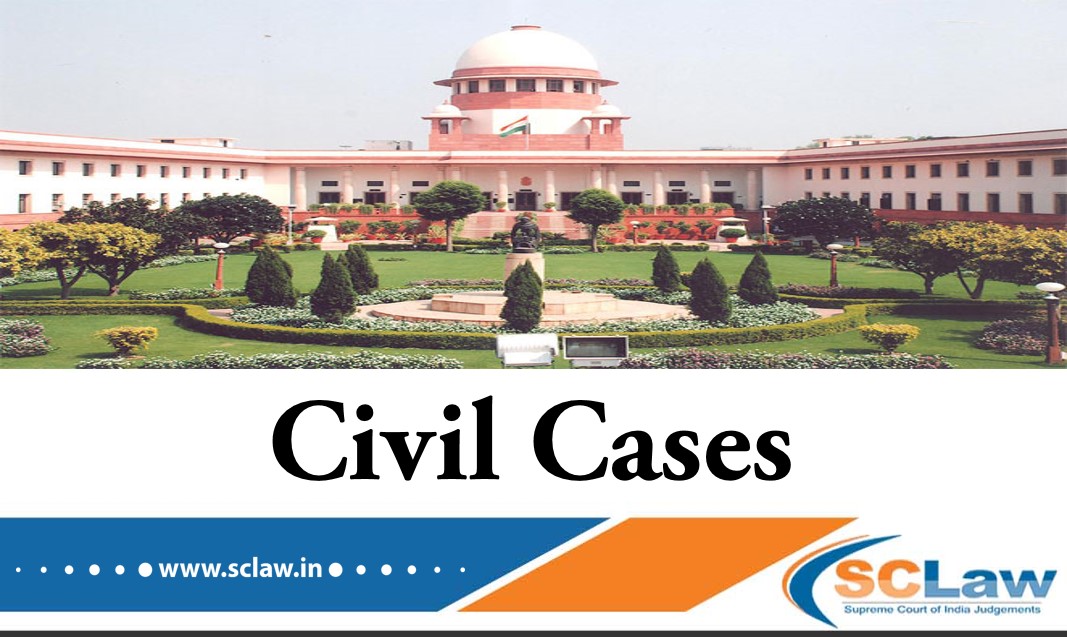Criminal Procedure Code, 1973 (CrPC) – Section 245(3) (as applicable to West Bengal) – Discharge – Ground of delay in trial – Entitlement – Accused not entitled to discharge as ground of delay in trial which is caused due to his own wrong.
(1996) 4 AD 80 : AIR 1996 SC 2158 : (1996) CriLJ 2885 : (1996) 2 Crimes 133 : (1996) 2 CTC 507 : (1996) 5 JT 537 :…
Civil Procedure Code, 1908 (CPC) – Order 1, Rule 10 – Impleading Necessary Parties – Where the question related to interest chargeable on the loan advanced by the Bank and rate of interest was being decided on the basis of circulars issued by Reserve Bank of India – In such circumstances RBI allowed to be impleaded as a party.
(1998) 6 AD 371 : AIR 1998 SC 3000 : (1998) 94 CompCas 569 : (1998) 2 CTC 381 : (1998) 5 JT 655 : (1998) 4 SCALE 651…
Constitution of India, 1950 – Articles 12, 14 and 16 – Assam Industrial Development Corporation (A1DC) Voluntary Retirement Scheme, 1992, Clauses 3 to 8 – AIDC Limited (Employees) Service Rules, 1992 – Rule 18 – Voluntary retirement – Golden hand-shake voluntary retirement scheme – An open option made available to all employees subject to fulfilment of conditions prescribed under the scheme – Option once made not to be allowed to be withdrawn
AIR 2000 SC 2769 : (2000) 87 FLR 190 : (2000) 10 JT 9 : (2000) 2 LLJ 1125 : (2000) 6 SCALE 198 : (2000) 7 SCC 390…
Civil Procedure Code, 1908 (CPC) – Order 47, Rule 4 – Review – Limitations – High Court without considering the question whether judgment/order sought to be reviewed suffered from any error, reappreciating the evidence, not correct.
(2002) ACJ 1822 : AIR 2003 SC 2095 : (2002) 1 JT 549 Supp SUPREME COURT OF INDIA RAJENDER KUMAR AND OTHERS — Appellant Vs. RAMBHAI AND OTHERS —…
Education – Admission – Medical Course – Cut-off date fixed for admission cannot be used as technical instrument to deny admission to appellant when she was arbitrarily denied admission – Court should not pass interim order when admission is disputed.
AIR 2012 SC 3396 : (2012) 6 JT 283 : (2012) 6 SCALE 287 : (2012) 7 SCC 389 : (2012) AIRSCW 4073 : (2012) 4 Supreme 511 SUPREME…
Civil Procedure Code, 1908 (CPC) – Section 100 – Appeal – Second appeal – Non-consideration of material evidence by First Appellate Court – Wrong assessment of facts – Second Appellate Court can decide true nature of a transaction on the basis of admitted facts – Interference in second appeal affirmed.
AIR 1971 SC 1049 SUPREME COURT OF INDIA RADHA NATH SEAL (DEAD) BY HIS LEGAL REPRESENTATIVES — Appellant Vs. HARIPADA JANA AND OTHERS — Respondent ( Before : J.…
Kannan Devan Hills (Resumption of Lands) Act, 1971 – Sections 4 and 5 – Land in question – State has legislative competence to legislate on Entry 18, List II and Entry 42 List III. This power cannot be denied on the ground that it has some effect on an industry controlled under Entry 52, List I. Effect is not the same thing as subject-matter
AIR 1972 SC 2301 : (1972) 2 SCC 218 : (1973) 1 SCR 356 SUPREME COURT OF INDIA THE KANNAN DEVAN HILLS PRODUCE — Appellant Vs. THE STATE OF…
Partnership Act, 1932 – Section – 69 – Civil Procedure Code, 1908 (CPC) – Order 30 Rule 4 – Promissory note – The respondents filed a suit to recover a sum of Rs. 58,880 on the foot of a promissory note dated April 1, 1960 to recover the principal sum of Rs. 46,380 and interest which accrued thereon – The respondent- firm is a registered partnership firm and under Section 69 of the Partnership Act, the suit is maintainable
(1996) 8 AD 562 : (1997) 1 BC 503 : (1996) 10 JT 38 : (1996) 8 SCALE 17 : (1996) 11 SCC 480 : (1996) 7 SCR 152…
Partition – What manner the property are required to be enjoyed in equal shares? – On perusal of the partition deed, it is clear that the view of the High Court is not correct. It is seen that the ground floor was allotted to both the appellant and the respondent for common enjoyment and first floor was allotted to one party and second floor was allotted to another party
(1996) 8 AD 553 : (1996) 8 SCALE 243 : (1996) 11 SCC 496 : (1996) 7 SCR 812 Supp SUPREME COURT OF INDIA K.M. SRINIVASAN — Appellant Vs.…
Punjab Municipal Act, 1911 – Section – 61, 62, 68 – Levy of property tax – The delegation of power to levy property tax in favour of the Chief Administrator of Union Territory of Chandigarh Administration was in excess of legislative power
(1996) 8 AD 391 : (1996) 8 SCALE 13 : (1996) 11 SCC 497 : (1996) 7 SCR 315 Supp SUPREME COURT OF INDIA CHIEF COMMISSIONER, UNION TERRITORY, CHANDIGARH…














